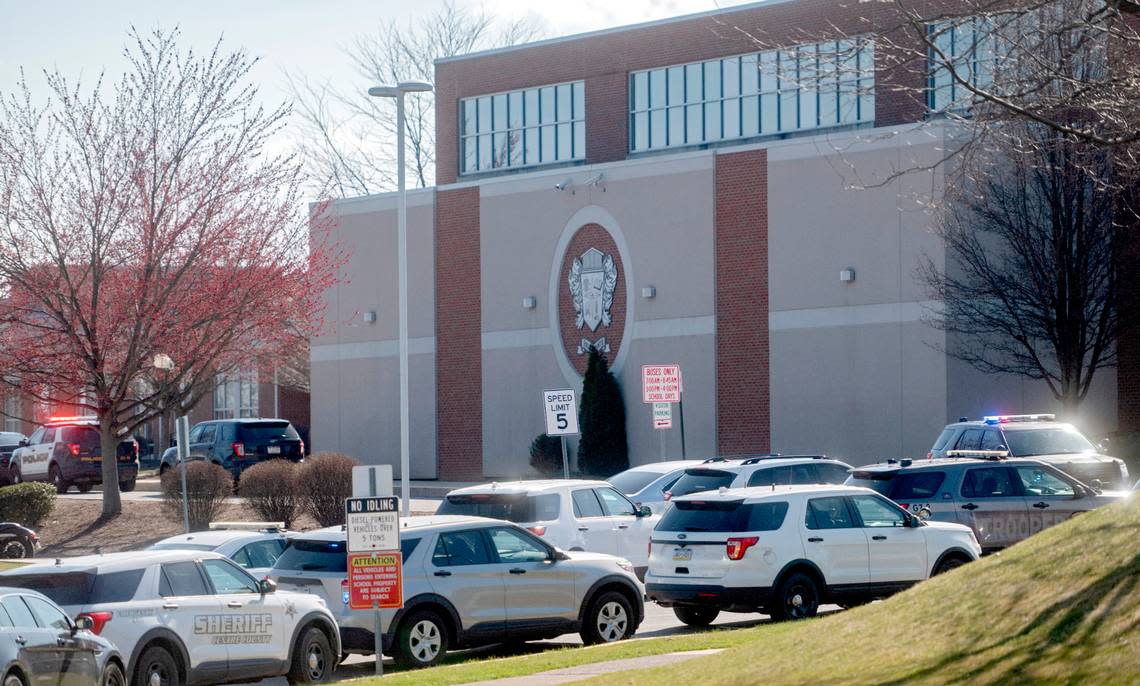Is swatting illegal in Pennsylvania? What to know about the dangerous hoax practice

Bellefonte Area High School locked down for about an hour Wednesday morning after receiving what police believe was a computer-generated call that threatened a shooting.
By 10:30 a.m., students were released to their parents after the threat was not deemed credible.
Calls with similar content were also received at several schools across Pennsylvania, state police said. Though each incident remains under investigation, “all claims in these calls have been determined to be false,” the department wrote.
The calls in question were made out to 911 centers across Pennsylvania, each alleging the existence of a bomb threat or an active situation. On Twitter Wednesday morning, state police said faked calls, likely performed as an act of “swatting” to draw out a large police presence, are not to be taken lightly.
Here’s what you need to know about swatting in Pennsylvania.
What is swatting?
Swatting is an illegal practice through which someone, generally under the guise of a false identity or using another person’s phone number, calls the police to report an alleged serious emergency at another location. Swatting is typically performed to provoke a robust response from law enforcement that aims to harass or intimidate victims.
Swatting is not to be confused with “spoofing,” a separate practice through which someone uses technology to falsely localize caller ID information.
The U.S. Department of Justice has used the term “swatting” since at least 2007, according to the agency’s site. The practice has grown increasingly common in recent years, according to a 2022 investigation by WIRED that found more than 90 false reports of school shooters in the second half of last September alone.
Estimates of swatting cases in the U.S. jumped from 400 cases in 2011 to more than 1,000 in 2019, the Anti-Defamation League reports. Those figures are tough to track because the Federal Bureau of Investigation does not track swatting as its own crime, while local police may fail to distinguish swatting incidents from other false reports.
On top of the existing dangers presented by hoaxes, swatting can be a costly nuisance, the ADL says. On its own, one incident of a fake bomb threat reported in 2014 on Long Island, N.Y., cost more than $100,000.
Is swatting illegal?
Yes. In Pennsylvania, swatting can result in “serious criminal and civil penalties” for violators, state police say. Swatting can also be prosecuted through some federal criminal statutes, though there is no statute at the federal level that is specific to the practice.
Swatting is generally punished as a felony under U.S. law, and convictions are highly dependent on the nature of the hoax. If charged with crimes of false information or a hoax, a swatter could serve up to five years in prison. That sentence could stretch up to 20 years if “serious bodily injury” occurs as a result of the incident, federal law says.
Some states, including California and New Jersey, have passed laws that qualify swatting incidents as hate crimes if they are racially motivated or stem from related prejudices toward other groups. Such a classification could strengthen a potential swatting-related conviction.
Practices to help prevent swatting
Although swatting is a complex issue, Pennsylvania State Police offer a few steps that could minimize your risk.
Police say you should look yourself up online to see if any identifying information, such as your phone number or address, is listed publicly. Take steps to remove unwanted published information from online databases.
You should also review your social media profiles to maximize security. Consider changing privacy settings to limit access to existing friends and contacts. You should never share addresses or phone numbers on social media platforms, state police say.
Should a swatting incident occur near you, take screenshots of relevant information such as social media posts, instant messages and texts, which could later be deleted by the sender. Notify local law enforcement if someone threatens swatting.
Pennsylvania State Police operate a terrorism tip line at 888-292-1919 and maintain a dedicated email account, tips@pa.gov, to receive reports of suspicious activity and behavior. Both are monitored 24 hours a day, seven days a week.

